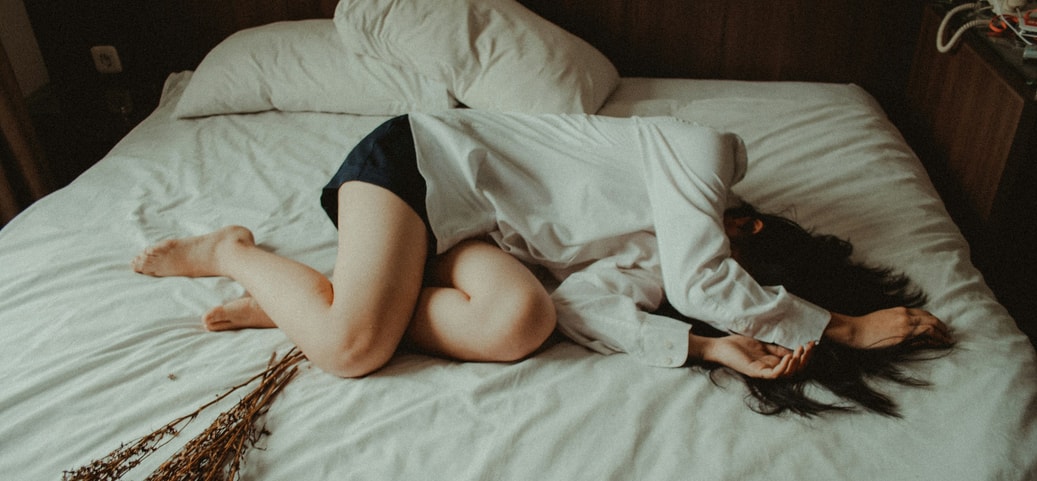Sleeping without a pillow: the lowdown
When it comes to getting a restful night’s sleep, most people would agree on one thing: a comfortable bed needs a mattress, duvet and pillows. It’s hard to believe that sleeping without a pillow can actually be comfortable and may even be healthier for us. We explain in which cases a pillow can have a negative impact on your health and when it is better to sleep with your head elevated.
by CALIDA
August 7, 2024•5 min reading time

Sleeping without a pillow: Find out how it can affect your sleep.
Table of Contents
Is it healthy to sleep without a pillow? It depends on your sleeping position
• Stomach sleepers: ditch the pillow
• Sleeping on your back without a pillow? Not always good for you
• The side position: a pillow is a must!
Benefits of sleeping without a pillow
Is it healthy to sleep without a pillow? It depends on your sleeping position
Before we explain whether or not you need to sleep with a pillow, we would like to talk about the best position to be lying in. This is not about whether you’re a stomach, side or back sleeper, but about your body’s posture.
It should be as relaxed and natural as possible while sleeping, meaning your spine should run in a straight line from the cervical spine through the thoracic spine to the lumbar spine, without the head and hips sinking or overextending.
With an ergonomic sleeping position, you can take pressure off your spine and thus prevent tension and pain in your entire upper body. In some cases, a pillow can contribute to a healthy posture, but it can also do the exact opposite; it depends on your individual sleeping position.
Stomach sleepers: ditch the pillow
While the stomach sleeping position is a rare one, it is all the more appreciated by those who sleep in it, who feel secure and as if they are being embraced by their bed. However, there are a few things you should keep in mind to ensure that this sleeping position doesn’t cause tension. Very important: your pillow has to go!
In fact, the stomach sleeping position is the only one for which you should absolutely say goodbye to your pillow. The reason for this is that the elevated position of your head results in significant hyperextension of the cervical spine and causes your neck to bend in an unnatural way – this quickly leads to neck pain and tension that can spread to your head.
In addition, stomach sleepers often have two other problems. Firstly, the pillow is right in front of your nose or mouth, which makes breathing difficult. Secondly, the pillow causes unsightly pressure marks on your face. Although the latter could be prevented by using a velvet pillowcase, there are still many reasons in favour of saying goodbye to your pillow if you sleep on your stomach.
Sleeping on your back without a pillow? Not always good for you
Whether or not you need a pillow as a back sleeper depends primarily on the firmness of your mattress. If your mattress is rather firm, the pressure on the thoracic spine can become too strong; it will be pressed flat against the natural S-shape of the spine. You can also end up with a gap between your neck and the firm mattress, which can also lead to postural problems.
If you’re a back sleeper who wants to benefit from sleeping without a pillow, you should opt for a medium-firm to soft mattress. This allows your shoulders and pelvis to sink slightly deeper, which takes the pressure off your thoracic spine.
With the right mattress, sleeping on your back without a pillow can be the optimal way to sleep for relieving tension and bringing your cervical spine into the right position. Some orthopaedic specialists even describe this sleeping position as the healthiest.
The side position: a pillow is a must!
While not using a pillow in the stomach or back position can certainly have its advantages, the situation is different if you sleep on your side. In this position, you should have your head resting on a pillow to take pressure off your neck vertebrae. Otherwise, your head may bend sideways or there may be a gap between your neck and nape, which can lead to uncomfortable tension.
To ensure a particularly restful night’s sleep, there are even special pillows for side sleepers. This type of neck support pillow is slightly higher than normal pillows, which is especially important for firmer mattresses. If you have a soft mattress, your head will sink a little deeper anyway; in this case, a flat pillow will do if you sleep on your side.
Benefits of sleeping without a pillow
Sleeping without a pillow in the stomach and back position can prevent and even relieve uncomfortable tension and misalignment of the spine. But these are not the only advantages of not using a pillow – certain people can benefit from sleeping directly on their mattress.
Sleeping without a pillow can reduce snoring
Snoring can have many causes. A common reason for this night-time racket is the tongue, which falls backwards and blocks the airways. This mainly happens with back sleepers who have a particularly soft or thin pillow.
If you are a back sleeper, you should avoid using a pillow and opt for a slightly softer mattress to ensure optimal posture while you sleep and to prevent your head from overextending. Less snoring and an ergonomic sleeping position are not only good for you – your partner will be thankful for them, too.
Fewer spots and wrinkles
People who sleep on their stomach are all too familiar with it: you wake up in the morning to find your pillow has left deep creases pressed into your face. In addition, the constant contact between your skin and the pillow can lead to blemishes. The first reason for this is the lack of air that reaches your skin, and the second is moisture and any dirt or dust that has accumulated in your pillow.
These problems can be easily avoided by not using a pillow. Stomach sleepers are most likely to be affected by wrinkles and spots, and should sleep without a pillow anyway to take pressure off their spine. If you sleep on your side, a velvet pillowcase and regularly washing your pillows and pillowcases can help to counteract these problems.
Allergy sufferers benefit from not using pillows
A pillow is not only a hotbed for dirt and dust mites, they also collect pollen that comes in through the window from outside. If you suffer from hay fever and a blocked nose, especially at night, sleeping without a pillow can help to alleviate the symptoms. Back and side sleepers, however, should always make sure that their posture and the position they are lying in is correct.
Discover more interesting blog posts:


